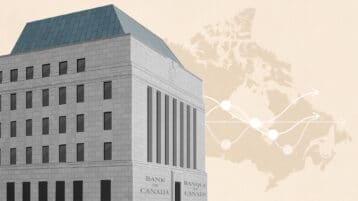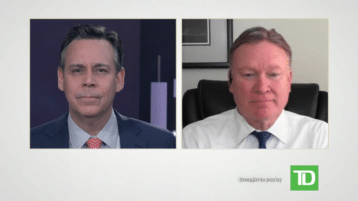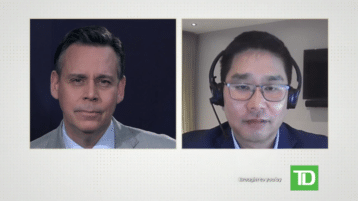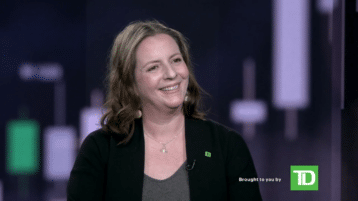Print Transcript
Hello. I'm Greg Bonnell and welcome to MoneyTalk Live, which is brought to you by TD Direct Investing. Every day I'll be joined by guests from across TD, many of whom you'll only see here. We'll take you through what's moving the markets and answer your questions about investing. Coming up on today's show, Canadian inflation came in a bit cooler than expected, but it's still sitting way above the BOC's target rate. We'll discuss what it means for the future path of rates with Michael O'Brien, portfolio manager at TD Asset Management. And in today's WebBroker education segment will discuss the platform with Caitlin Cormier. Just email moneytalklive@td.com. You can fill it that your response box written to the video player here on WebBroker. Now before we get to all that in our guests of the day let's get you an update on the markets. We will start here on Bay Street with the TSX Composite Index. Of course the big event of the week is tomorrow. The US Federal Reserve. That two-day meeting now. Coming out the other side of that. 75 basis point hike. It hasn't been completely priced under the market either. ahead of that we do some downward pressure on stocks. A full percent. Let's see some downward pressure on crude oil prices since some of the energy trade,you have Shopify at 4241 share down a little more than 2 1/2%. South of the border, let's check on the broader read of the market, the S&P 500 ahead of the Fed rate feeling some downward pressure. By the end of the session… A bit of a choppy run into the Fed. … The tech heavy NASDAQ let's see how it's bearing against the broader market. Half a percent of the downside and Exxon. Some of the energy names. 91, 95 nothing too dramatic 1.3% to the downside. And that's market update. Canadian inflation eased for a second month in a row in August but it's still sitting at an annual rate of 7%, much higher than the Bank of Canada would like to see. Joining us now for what it means for interest rates in the economy overall is Michael O'Brien, Portfolio Manager at TD Asset Management. Great to have you back of the program. >> Thanks for having me back. >> The biggest fight has been against inflation. We have the central banks and then a little cooler than expected print. Does that mean all that much for the path of bank policy in this country? >> I don't think it has a big impact on the next decision or two. I think the Bank of Canada is pretty locked-in with what they want to do the net Mech next meeting or so. But clearly a step in the right direction no question about it. I think everyone realizes we need to see inflation come down so central banks can back off and we probably need the central banks to back off before equities as an asset class start to move significantly higher. So the fact that we now have had a couple of months in a row where inflationary pressures seem to be peeking, if not backing off too much, that's gotta be taking the winds where we can get them. This is a good news report. >> At the same time you talk about down the road what it means for equities and our equity portfolios after the Summer rally. It's been a tough go again as we said, the Fed is on deck for tomorrow, defending depending on how tough Jerome Powell is. How tough is he going to speak to us? We have the Summer rally and then Jackson Hole. There are some stern words there. They seem to be taking them to heart finally. >> I think that's exactly it. If you think back to earlier this Summer, pre-Jackson Hole, I thought the FOMC, the Fed committee had been pretty clear about what they wanted to accomplish. They wanted to move fast, quickly, the front loading of the policy rate hikes. … We want to hold them at slow inflation and see what happens. But if you look at July there was a lot of market enthusiasm about a so-called "fed pivot" which was to say the Fed was on the verge of backing off and clearly that was not at all the intentions so I think Jackson Hole was really Chairman Powell setting the street straight and saying "no that's not were talking about. Rates will be here for a while." So I think that was really the wake-up call back then. I think more and more people, as the weeks of gone by since Jackson Hole, more and more people are getting the message that rates are going to go higher from here and then they are going to stay there for a while. I think that was the disconnect with the FOMC and it was probably troubled by in the Summer. Most investors, most of the forecasters had rates going up to, 375, 425, which I think is a realistic landing point for the Fed policy rate. But then they had these interest-rate cuts coming in in the second and third quarters of 2023. I don't think that was acceptable to the FOMC. That's not what they wanted to can indicate. SoI think most people are on a more realistic plane. On the same page as the FOMC. I would not expect the same magnitude of surprise coming out of tomorrow's decision. But at the same time I don't think we should be under any illusion that they view their job is being done. There is more work to do here. >> More work. They said there would be pain as well. So when we take it back to the health of our portfolios. We do know the central bank, whether hours or the Fed, are trying to tame inflation in that pursuit. The big concern is going too far. And you don't get a soft recession or a gentle recession or whatever it is that we hope a recession can look like. You get some tough times. That doesn't sound like a great outlook for equities. If they can't land that soft landing. >> No and that obviously we have been seeing it reflected in the broader market action for several months now. Right? This, we've got to be realistic. This is a difficult environment for equities as an asset class. By that I mean if central banks are tightening, pretty much in unison across the planet with the possible exception of China and Japan, everybody else's tightening policy rates. Growth is slowing. Because it needs to. Inflation is, like I said not just here in North America but across the planet. That is generally a difficult time for equities as an asset class to shine. It doesn't mean there are not opportunities in the market, it doesn't mean that some stocks don't present opportunities. It also doesn't mean that we are going to be in this state forever. What it means to me is we just have to be a little patient here. Better days will come. But in order to get to that point, we do need the central banks to stop raising rates. The only way the central banks. Raising rates is if they, collectively, see inflation begin to come down. Not just on one off or on good report. But kind of on a consistent basis across a broad spectrum of measures. So like I said at the beginning, this was a nice outcome for the Canadian CPI report today because not only did you see the headline number come down, and not only is it down nicely on the month, it's also down over a percent from June. So we are making progress. But more than that, it's sort of beneath the energy shock of gasoline prices up in gasoline prices down. The broader, core measures of CPI in Canada actually trended in the right direction this month. And so I think we need to see, to get more constructive on the market as a whole is we need a few more prints like this where the core measures, the broad swath of incoming price state is indicating that the worst is behind us because that's what the central bankers need to see to back off. Once the central bankers feel they've done enough and can communicate to the markets that policy rates probably are not going up a lot more, I think that's when we get more constructive on the "all in on equities" trade. But that is not today. We saw the way to go to get there. >> You mentioned patience. Now we are being told "listen, it's a long road and we are not going to run to the rescue." Patience. . . I should have it at my age but I feel I don't have it. >> Who does. I think you hit on a really important point. This is a different environment than most of us have gotten used to over the last decade. Over the last decade, the issue was that central bankers could not get enough inflation. They kept under shooting the policy targets. Because of that it seemed like growth would waver. Trouble on the horizon, something happened, something broke… The central banks were very quick to come in and fix it. Because what they were fighting was inflation that was under shooting the target. So that's why the Fed was always our friend throughout that period. "The Fed will save the day". And they pretty much did for the better part of 10 or 15 years. I guess going back to 2009. This is a very different environment. Right now, that was an alignment of interests. Investors and policymakers both had the same interests which was to protect growth so that inflation could get back to target. Now, those two parties are no longer aligned. Investors don't want the same thing as the central bank wants. The central bank wants slower growth and higher rates, less inflation. You know, we tend to want lower rates and higher growth. We no longer are on the same team. So in, when you get this divergence, when they are no longer aligned, that old "don't fight the Fed" it's the central bankers that will prevail in this battle. So to your point that's why we have to be patient and let this process play out. >> That's my new mantra now. I need a plaque for my desk for the morning. Great start to the start of the show. We will get your questions about Canadian stocks of Michael O'Brien in just a moment's time. A reminder of course that you can get in touch with us any time by emailing moneytalklive@td.com. and now an update on the top stories in the world of business and seal the markets are trading. There were almost 1 million job openings in Canada this spring-the highest quarterly number on record. New numbers from Statistics Canada show job vacancies jumped almost 5% compared to the first three months of the year. And the agency says employers across all sectors in Canada were actively looking to fill positions. And as business owners looked to attract workers, average hourly wages jumped more than 5% year-over-year. Shares of Ford are in the spotlight today. The automaker is warning of $1 billion in additional costs this quarter as inflation drives the costs of parts higher. Ford is also citing challenges and the availability of certain parts – saying it will result in a higher than anticipated number of vehicles in its inventory this quarter. Peloton is adding a rowing machine to its offerings as the at-home fitness company looks to turn around the business. Peloton row is starting at $3995 US with an additional $44 a month for US online service. With the end of the pandemic, and returned to Jim's this has pressured the business. Let's check on the TSX Composite Index now. We'll call the 207 points to the downside. 75 basis point hike pretty much on the table. Although the market has not fully priced at the chance of 100 so it will be an interesting one. Of course we will be on top of it all week for you. Right now you have the S&P 500 down almost 3/4 of a percent. We are back now with TD Asset Management's Michael O'Brien, taking your questions about Canadian stocks. Let's get to them. Right out of the gate. What's your outlook for the banks right now? > The banks. Well we just finished their third-quarter earnings reports and I thought they came in quite solid. I guess to be a little more balanced we could say "mixed". Because earnings growth is a bit slower than it has been and that was largely due to an increase in PCL's or loan losses. But these are coming off very low levels. So that doesn't concern me. The other area of weakness in the quarter was in capital markets, investment banking, truly a slowdown. That tends to be a volatile income line. So again that doesn't phase me too much. The areas of the core operations that I care most about in terms of your domestic retail lending franchises, they actually had very solid of 1/4. So I was pleased with that across the board. Capital ratios, in other words how solid the banks look, obviously that's becoming more and more the focal point. Capital ratio is very solid so I was quite happy with that. So generally speaking, I thought they delivered very solid results in an increasingly murky environment. The issue going forward is going to be obviously, starting from that macro conversation you and I just had, is how much the economy needs to slow in order to ease these inflationary pressures and flowing then to the banks. How will that impact their lending books? There loan losses? That's really the big debate around the stocks. The stocks have been doing okay but they look relatively inexpensive by historical metrics and that's telling you investors obviously expect rises here. When I look at the banks I see very solid operations. Very well run businesses. And so to me, the question is "do we focus overly on what the credit cycle will be? Or do we look through to what appears to be a pretty good outlook beyond this next two or three quarters?" . I think a lot of that is reflected in bank share prices right now and I'm actually constructive in the group. We just need to be aware that in the short term, by which I mean the next three, six, nine months, you will see more loan losses materialize. That's part of being a bank and lending through the cycle. It's just a matter of watching how well-controlled those are. Because unless there loan books get away from them, I think they will come out of the other side of this in very healthy shape. >> Alright that's a nice rundown on the Canadian banks. Let's talk about another key sector for this economy and for the market. The price of oil declining recently. What is not actually mean for the energy sector? >> Well for you and me it's been a nice break at the pumps. >> Yes when you're driving down the road and you see that sign and you think "I can live with that." >> That's nice for us. For the commodity producers, for the oil and gas producers, as oil has come off those peak levels, post the Russian invasion of Ukraine, obviously when the underlying commodity prices fall, that takes a little bit of the enthusiasm out of the stocks themselves. But I think one thing that is been a positive sign for me in recent weeks is as oil prices have been chopping around and heading lower, the energy stocks have actually started to outperform the commodity itself. So a name like Canadian Natural Ressources is acting a little better than WTI or… Oil. Investors are starting to look to the near term choppiness of the oil markets and looking ahead to looking to 2023… Saying "okay let's say the Chinese get past there is zero COVID strategy and joint in Chinese oil consumption coming back… We are not quite sure what's gonna happen with the EU's embargo of Russian oil. Supposed to be in December. The US strategic petroleum reserve, they've been releasing a million barrels a day. That's supposed to end soon. I think the markets are starting to focus more on the implications of those factors. Which are quite positive for oil going into 2023. As opposed to getting too concerned in the day-to-day gyrations about if there is a recession. How much is there. So I think markets are starting to try to get a little more positive. But it's still a very choppy market here. >> Is there a risk of a big upside risk? Given supply constraints that we know exists. If China comes back with a big appetite next year? They get past COVID zero and realize it could be a volatile trading on the upside? >> I think a good point is if you look at the symmetry of the outcomes… I think there is not a lot of downside. Oil today, WTI is in the mid 80s. You've already seen the Saudi's and OPEC come out a few weeks ago when oil prices got to this level saying "we are happy to take supply off the market if you don't need it." That was a subtle way of saying there is downside support. OPEC will not just sit and watch oil prices fall. So I don't think there's a lot of downside from here. On the other hand, you could have quite a bit of upside if some of these shocks permeate through the oil market or just if supply and demand gradually grind the price higher with, like I said, you should expect China to come back at some point. Zero COVID is in perpetuity. So I think the risk reward here is stilted more to the upside. The chances of something going really well are higher than the chances of something going really poorly. But in the here and now, oil stocks, energy stocks, they are always going to be very volatile so any time you are in a very uncertain macroenvironment like we are today, they are going to be volatile stocks. But like I said, looking out three, six, nine months… I think there is more opportunity for upside than there is for downside. >> Having patience. That word again permeating through our discussions. Another question from the platform. Is this a good time to be looking at big tech stocks? > So the tech stocks have corrected a lot I would divide them into two different buckets here. Big tech, I don't know if you would say it synonymous with the real blue-chip leaders like your Microsoft and Apple's and Google's… But if we focus on that collection of stocks, they are obviously the bluest of the blue chips, incredibly powerful franchises and they have come off a lot. So when I think through my portfolio, what could go right what could go wrong? I don't spend a huge amount of time worrying about those stocks in terms of something fundamental breaking. It's more if there is downward pressure on the market as a whole. Because they are such an important part of it, they will be dragged down with anybody else. Then there is a lot of other stocks which are more of the speculative or higher growth companies where they have very bright futures but not as much delivery in the here and now. Those stocks have come down a lot but they continue to struggle and I think the key here is, the connection we should watch for, is as long as interest rates continue to grind higher, it's going to be really difficult for that part of the technology market to work. But when you bring it back to the real leaders, the Microsoft, the googles, I think you are going to be okay in those stocks, you just have to let this cycle play through like we've been talking about. But they're going to come out of this fundamentally in a very strong position. And a lot of the value correction has run its course now. It's just until we get to that turning point in the macroenvironment, interest rates stopping, this perpetual grind higher. It puts a bit of ceiling on them for the time being. >> As always at home make sure you do your own research before making any investment decisions. We will get back to your questions with Michael O'Brien in just a moment's time. A reminder of course you can get in touch with us any time by emailing MoneyTalkLive@td.com. now let's get to our educational segment of the day. There are plenty of ways you can customize WebBroker to better meet your needs and joining us now to discuss is Caitlin Cormier, Client Education Instructor at TD Direct Investing. Caitlin show us how users can customize their experience. >> Thanks. Our platform we have on WebBroker, it's not the most customizable however there is still a lot that can be done within the platform to make it a more unique experience for you as an investor. So let's just hop in and see what different things we can actually customize within the platform to make it the best experience for you as an investor. So right up at the top right-hand side of the screen, you should see your name, and a little drop down menu here. Let's click on "customize site". This will take us to the main area for customization. So as you can see you also have trade notifications, security settings, trading password renaming account… Agreements and messages. Today we will only focus on the customization part. For example if you are logging in may be at work or in a public area into your trading account, you would like to have something other than your whole page show up first you can switch to something different for example markets overview. You can also go to something more specific like your performance or holdings or dashboard. There is lots of different things you can have your start page be so you can kind of jump right into something more specific as soon as you open up the platform. Down below, we have account preferences that you can make changes to. So if there's one particular account that you could use and do the majority of trading in, some of the other ones maybe not as much, you can go ahead and set a specific account to be your default. Also navigating the site again, you can make the default account the one that it always goes to on those trading or status pages. The default performance view is also an interesting one. We covered a little on another education session but it is basically is the difference between a time rate of return so specifically the return over that period of time. Or personally which also takes into account any deposits or withdrawals that you have done your account so it gives you a more specific rate of return as an individual. If you have questions about that reaction of a great video that you can watch that gives a bit of an idea of how those different types of returns work. But you can choose one of the other to be your default rate of return with an WebBroker. Another really popular one here is session timeout. Perhaps you keep WebBroker up in the background while you're working for throughout the day. I know that certainly the case for me and probably for you as well Greg. It's always kind of running in the background there. So you can actually have it remain idle for a longer period of time before it automatically logs out. So that means that once you get back in there, you're ready to place a trade and hit "submit" it doesn't pop you back out to the login screen. You can go ahead and submit that. Golf course, you always want to make sure that you have password-protected computers or you are the only one that's accessing that computer to make sure you're not having any security issues. But definitely it can be a factor here with changing the session timeout. Options chain… They can get some customization about what you'd like to see and finally account holder name. A lot of us go buy a nickname, are in middle name… Whatever shows over the top right-hand corner will be your legal name. So you can go ahead and change it to something else. A more preferred name so you have that done. Always make sure to click the save button or else none of those changes you went through will actually take effect on your account. So lots of little things that you can do to customize that WebBroker there. >> Most definitely that will get someone on the path to making the page more tailored to their needs. Any other places on the platform where they can customize their experience? >> There is one other spot we can narrow down on something specific to the investor. So what we can I do is were in a hop into the "research" page. Under "markets" and click on "overview". If you notice along the top we have some industries as well as the Canadian dollar. Unfortunately we have an update that's got a little bit of read it today. You'll notice there is an edit button on the right. You can actually click there and make some changes to what you see. So if perhaps you want to see the TSX compensate, the S&P 500… Maybe you want to have another industry listed there. Maybe you want to have crude listed there. You have some different options that you can change too. So we can put that to the S&P 500. Sorry my screen is a bit out of look there. For example US gold… The Canadian US dollar… Also we can do dollar changes or percentage changes as well. So you can update that in click save and it will automatically update along this top banner. So a bit of customization there. A couple different things to make it look a little different based on what you're looking for specifically. >> Great stuff as always Caitlin. Thanks for that. >> Thank you very much. >> Caitlin Cormier, Client Education Instructor at TD Direct Investing. And make sure to check out the Learning Center and WebBroker for more educational videos and master classes and webinars. Before we get back to your questions about Canadian stocks for Michael O'Brien, a reminder of how you can get in touch with us. Our guests are eager to hear what's on your mind. Email us anytime at moneytalklive@td.com or use the question box below your screen right here on WebBroker. Writing your question and hit send. We'll see if one of our guests can get you the answer you need right here at MoneyTalk Live. We are back now with Michael O'Brien, taking your questions about Canadian stocks. We have one that just came in hot off the platform. Thoughts on Alimentation Couche Tard. >> It's a nice business. Canadian store retailer so you think about why you would shop there. It's typically you are filling up your gas tank, buying some snacks, some groceries. Some beer … So like these other consumer Staples names, it tends to have those defensive qualities in times when the economy might be slowing. It's also, if you look back at Couche Tard history, what really made in the company they are today is some very smart acquisitions. They have grown through acquisitions for many, many years. So as I sit here today, the two things that I think about in terms of how much I like the outlook for Couche Tard, one would be US fuel margins which tend to balance and bounce around a lot. Right now they are very high levels. If you're thinking about the stock, you have some sort of a view on whether there is US fuel margins will normalize or come back down closer to history or whether they are at this level and will remain at this level going forward. So that's one thing you need to think about. The second is just to ask if they will be able to continue to find acquisitions the way they have in the past? Or is this going to be more about organic growth? In other words, how fast they can prove their own operations? When I think about the acquisition environment, in a sense, they are a victim of their own success that they have done so well and have become so big. They don't have many target left. So it's a nice problem to have. So it might change the nature of the story a little bit going forward. But again, at this point in time, investors are a little nervous about how the economy is going to progress here. These Staples companies like Couche Tard, like some of the grocery retailers, they are not a bad place to be. >> Electric vehicles… If they eventually do have that kind of market saturation, I guess like the makers are hoping, what becomes longer-term for Couche Tard? You stop and fill up the tank and get some snacks… >> What's interesting about Couche Tard, a bit unique, a number of years ago they made a major acquisition in Europe. One of the single biggest territories for the acquired stores was Norway. As a viewers may know, Norway is far ahead of most European and North American countries in terms of electric vehicle adoption. The Norwegian government has made a real push for a number of years to increase EV penetration. So if you think of them as a lead, early indicator of how Couche Tard's business might be affected, Couche Tard has had a real-life laboratory to watch these changes evolve over the last number of years. What they found is there are certain behavioural changes. They have to make a few changes about the store but by and large the Norwegian store is as productive as they've ever been. This is not a country that has EV penetration rising very rapidly, far ahead of the rest. So I think Couche Tard's management team is comfortable that they know how to deal with those challenges going forward. >> Interesting stuff. Let's get to another question right now. What's the biggest risk to the Canadian economy right now? >> So, I think we have to go with the obvious one which is housing. I think everyone realizes that the housing market has been, depending on which market you're looking at, whether Toronto or Vancouver… But broadly speaking, Canadian housing, house pricing has been very rapid for a long time. It got supercharged, obviously coming out of the pandemic for a number of reasons. Not the least of which was interest rates. So arguably in a time when housing had gotten a bit frothy, we at the Bank of Canada pushing through the most rapid rate hikes we've seen in decades if not forever. That is forcing mortgage rates up dramatically, variable interest rate mortgages, you know not nearly as attractive as they were 18 months ago. That's putting a lot of pressure on the housing market. So I think, certainly for external investors, foreign investors, that is the thing that they will worry about the most. You and I sitting here, if we are fortunate enough to own the home, housing market is just fine. But on a serious note, I think that is the challenge that the Bank of Canada and the government, federal and provincial government has put a number of measures in place for many, many years to try to prevent a real… >> We've had the worst of it. >> We've had stress tests. We will find out if the stress test actually prevented people from buying houses moving forward. We've had a lot of changes to the types of mortgages that can be extended. They've long done away with 40 year, 0% down payment. Much more stringent measures to make sure that banks are not lending foolishly. So we are really going to find out over the next 12 months how much good those measures did. Because at the time they were controversial. At the time they were painful for some people. They were trying to qualify for a mortgage. Now we'll find out whether they paid off. So that will be the real issue and like I said, foreign investors are going to be very sceptical about this. So it's a situation where Canada will have to prove them wrong. I think we can. But, that's where the battlefield will be. >> Interesting stuff. We talked a little about EVs what about copper? >> I think that's very well received across the investment community. Most of the people that I would talk to you are asking an opinion about copper. They would point to electric vehicles and electrification, more broadly, is very copper intensive. And you look at the mine supply today of physical copper and you would say by 2030, 2035, 2040… Very excited about where copper is going. But we have to get there first. So the most important focus for us as investors today is copper having many uses and one of the monikers it goes by is "Dr. copper" because it's an incredibly sensitive product to the economic environment. So the big debate today not just in North America but globally, is there going to be a global recession, a global economic downturn. In that type of environment, copper being such an economically sensitive metal, will struggle. Before we get to the implications for copper and 2030, we have to have a view on what kind of a slowdown we will experience in the next six, 12, 18 months. So let's focus on that first and then we will talk about electrification. Because it is a very bright long-term story for copper. >> Interesting perspective as always. Let's take a little break from your questions with Michael O'Brien. We'll get back to the questions on Canadian stocks and always may remember to do your own research before making investment decisions. A reminder that you can email us any time by emailing moneytalklive@td.com with your questions or you can use the question box right below the screen here on WebBroker. We'll see if one of our guests can get you the answer right here at MoneyTalk Live. While Canada's economic growth of 3.3% in the second quarter lagged expectations, it was still a standout performer on the global stage. But now we have inflation, rising interest rates taking hold, what's the outlook for the economy for the rest of this year and into 2023? With more on TD economics latest quarterly forecast is Anthony Okolie. >> Thanks Greg. Boosting average annual GDP growth in 2022 according to the latest quarterly forecast by TD economics. I brought a charter long. You can see there is cause for GDP growth through through 2024. Elevated commodity prices will provide a boost to Canada's expansion rate this year. Before decelerating in 2023. I've also brought, in the next chart, I've highlighted some of the key calls by TD economics forecast. We'll start with the labour market. TD economics expects to see slowing demand due to the impact of higher inflation and high interest rates which should push the unemployment rate higher to 6.5% by 2024. Now, on housing, the impact of higher mortgage rates will continue to weigh on residential investing through 2023. But TD economics does note that the prospects for nonresidential is actually brighter and that's based on the strength of commodity industries as well as developments of long-term resources and their projects. Now on inflation, TD economics expects headline and core CPI to reach 2.6% by the end of 2023. On rates, they see both the Fed and Bank of Canada hiking interest rates to a 4% terminal rate by the end of this year. TD economics may some appreciation versus US dollar in the coming months. That's going to depend on whether the risk of the financial markets eases as well is the Canadian economy maintains its performance on the GDP front. Greg? >> Given all that in the fact that the fight against inflation has been front and centre all year, any feeling in there? The report about the risk of inflation staying elevated? We don't want that right? The whole purpose is to bring it down. >> TD economics says the longer it is, the harder it will become. With Canadian inflation, it actually took a step in the right direction. That impact the 300 basis points increase that we've seen for the Bank of Canada so far this year. It's starting to slowly be felt by the economy. They expected that demand will slow in the coming months and that should help to bring down inflation of the long-term. >> Great stuff Anthony thanks for that. >> My pleasure. >> MoneyTalk Live's Anthony Okolie. Let's check on the trading. Starting on Bay Street whole back of one of the quarter percent, not a lot out there if you're on the market today. Let's check on Barrick Gold right now. A real terror this year. That would be the greenback and the gold Barrick down almost 3 1/2%. Aritzia, one of those retail names that really manage to do well during the pandemic. Today making some gains as well. Up one of the half a percent. The S&P 500, the Fed has entered into its two day meeting. Of course 2 PM Eastern time is when we look at the result of that. Expectation for another jumbo sized rate hike of at least 75 basis points. That seems to be where the street is leaving. The S&P 500 had a bad decision, down more than a full of a percent. Let's check the NASDAQ right now. Faring better than the broader market down 1/4% at this hour. And lastly forward, will jump at the top of the show how Ford was having some inflationary issues. Not taking that news very well. Down 10 1/2% right now. Back now with Michael O'Brien from TD Asset Management taking your questions with the state of the market. What's your view on life insurance companies? >> So the lifecos, it's a tricky environment. On the one hand they tend to benefit longer-term from higher interest rates. On the other hand, they have very large asset management within them. So with equities being challenged, that's kind of a headwind for them. I think, when I look at them as a whole, I see a group of stocks that are very inexpensive but also have some difficulty with the growth outlook. So it's going to be difficult for them to grow at least in the current environment. But, you know, the evaluation is on demand here. >> Another one, mentioning the price of gold… And what's happening on that front this year. What's your view on the gold miners? >> There is a lot of headwind to the gold bullion today. Typically when the US dollar is strong, gold is challenged. Right now, we've got probably the strongest US dollar we've had in many years. When interest rates, and particularly real interest rates are rising, that tends to be a headwind for gold which has no yield. So obviously those are two big strikes. But on the other hand, one of the hats that gold wears quite often is in times of, you know, geopolitical distress or tale of events, if you will, gold is seen as a safe haven. Certainly there are a lot of candidates for tail risk out there. A lot of geopolitical games being played. Well not games… Quite serious situations here. So I think the fundamentals of gold would suggest it will remain under pressure unless the US dollar changes direction. But you've got to remember that at any point in time, if something dramatic happens in Taiwan or Ukraine or whatnot, that's the type of environment where gold could catch a safe haven bid. So there's a bit of that. >> Michael, always play a pleasure to have you. I look forward to the next time. >> Thank you. >> Our thanks to Michael O'Brien, Portfolio Manager at TD Asset Management. On tomorrow's show, Robert Pemberton, Head of Fixed Income at TD Asset Management taking your questions. Remember it is fed decision day and the show will be ahead of that. 75 basis points to the upside is pretty much the call right now. A reminder that you can get your questions ahead of time by emailing moneytalklive@td.com and let us know what's on your mind. That's all the time we have for the show today. Thanks for watching. We will see you tomorrow. [music]
























